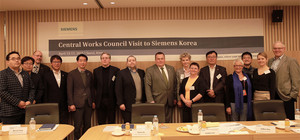https://www.dialog-igmetall.de/nachrichten/ifa-meeting-in-south-korea
27.07.2024, 11:07 Uhr
IFA meeting in South-Korea
- 22.04.2015
- International
On April 14th/15th, a meeting of employees‘ representatives from Germany and South-Korea took place at Seoul. The meeting followed the International Framework Agreement of Siemens and included as well an exchange between the representatives from Germany and South-Korea as a discussion with the Korean management.
The Works Council of Siemens Germany was represented by Birgit Steinborn (chairwoman), Robert Kensbock (deputy chairman), Bettina Haller (chairwoman of the Group Work Council), Harald Kern (chairman of the European Works Council), Bettina Müller (Regensburg), Dietmar Kuttner (Frankfurt) and Mimon Uhamou (Düsseldorf). The Siemens Labor Union from Seoul was represented by Shin Hawon (president), An Taejoo (vice president), Kang Hyangsu (vice president), Kwak Wonjoo and Jang Joon. Yoon Hyowon from the global union organization IndustriAll took part as a guest in the internal meeting of the employees’ representatives.
Birgit Steinborn explained the German system of employees’ representation and especially how this is working at Siemens. She also described the different tasks and roles of Works Council and union in Germany. She also talked about the International Framework Agreement of Siemens. This has also been translated into Korean language.
The Siemens Labor Union is a member of the Korean Confederation of Trade Unions (KCTU). It represents the employees of Siemens at Seoul and Gimpo. There are union elections every two years. The union has negotiations about the wage rises once a year. It also discusses with the management about the improvement of working conditions and social benefits for the employees.
Prof. Park Myung-Joon from the Korea Labor Institute compared the systems of employees’ representation and the union situation in Germany and South-Korea. The union situation in South-Korea is still very difficult. Companies and even government officials often think of unions as disturbing the economy and openly fight them.
Whereas unions in Germany are following a long tradition, in South-Korea unions came up together with the democracy movement in late 80’s. A problem in South-Korea is also, that the employers are unwilling to accept collective agreements for whole industrial branches. So collective agreements only apply to single companies and cannot balance the existing wage differences.
On the second day of the meeting, Mr. Kim Jongkap (CEO), Mr. Lum (CFO), Mr. Kim Kwanghwi (HR), Mr. Erb (head of HR World) and Mrs. Günther (HR World) represented the Siemens management in the meeting. Mr. Kim Jongkap explained the situation of Siemens in South-Korea. Siemens South-Korea is expanding. Since 2013, Siemens Energy Solutions is based in Seoul. There are also some production sites (Healthcare) and several offices of Siemens all over South-Korea.
Mr. Kim Jongkap especially emphasized the importance of the cooperation of the different divisions of Siemens. He said that it is crucial that Siemens is perceived as one company by its customers. Mr. Kim Jongkap and Mr. Lum also said that the management of Siemens should be ready to take more risks instead of focusing on the reasons that speak against some business activities. They said that Mr. Kaeser would support the attitude of being more open to risks.
Mr. Kim Jongkap also pointed out that his impression is that at businesses like Power and Gas, the sales organization is not acting close enough to the customers. In the discussion with the management, the union representatives from South-Korea expressed their worries about the future of the Healthcare division and its employees. Mr. Erb said that there are no plans to sell off the Healthcare business to another company. Mr. Kim Jongkap ensured that the working conditions and collective agreements for the Healthcare employees will stay in place after the new set-up of the Healthcare division inside Siemens.
The representatives of the Siemens Labor Union criticized that the local management at South-Korea does not have enough room for own decisions, for example in wage negotiations but also concerning other demands of the union.
Mr. Erb denied that there are strict requirements from the headquarter for wage rises. But of course, the local management has to keep budget limits. He evaluated the possibilities of the local management to make own decisions higher since the elimination of the cluster level at Siemens.
Both sides agreed on the improvement of the quality of information that the union will receive from the management in the future. Shin Hawon closed the meeting by describing the relationship of union, employees and management as being united in looking for a win-win-situation.


